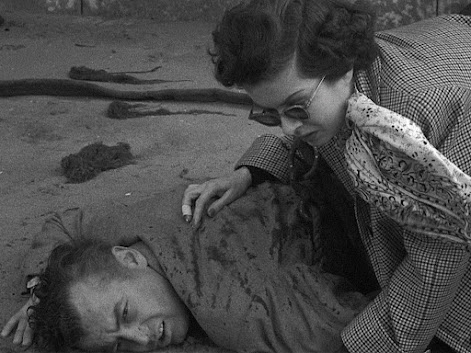Ordinary Lady Gets Blackmailed (again).
Some of you will probably recall that the inaugural film in our current series (Ordinary Ladies) was The Reckless Moment, a 1949 drama directed by Max Ophuls in which Joan Bennett plays a housewife who thinks (incorrectly) that her daughter has just murdered her deadbeat boyfriend (The daughter's boyfriend, that is; not Joan Bennett's boyfriend. Damn those misplaced modifiers!). In an effort to protect her daughter, she disposes of the body and hides any evidence of the death; and that's when the trouble really starts.
As I say, that was the film that we showed back in June (if you would like to refresh your memory, please click here).
Our next film (on the 28th of July) is a remake of that film, released in 2001 and starring Tilda Swinton in the Joan Bennett role.
The Deep End marks the first time I will be showing a film and its remake in the same series, but in this instance I feel that the two films compliment each other beautifully. (Also, if you want to be hyper-pedantic, The Deep End is not a remake of The Reckless Moment; both films are simply adapted from the same novel. But I digress.)
The Reckless Moment was released during the time of the Hays Office (Hollywood's extremely draconian censorship code) and much of the nuance of that film lies in what was not said. Joan Bennett's daughter has been fooling around with an older (rather sleazy) man, and when his body turns up on the beach, Joan Bennett immediately assumes that her daughter is the murderer. She also assumes that her daughter had been raped, and had killed her assailant in self-defence, but none of that is stated openly in the film. Under the terms of the Hays Office, murderers are not allowed to go unpunished, and rape cannot be portrayed, so the film is rather more subtle in its handling of these matters.
It's also made very clear later in the film that Joan Bennett is afraid that her daughter is pregnant (another forbidden topic) and of course James Mason has turned up by this point to blackmail her.
By 2001, American society had shifted quite a bit, and teenage pregnancy out of wedlock was no longer the social catastrophe it would have been to a middle-class household in 1949 (still not a good thing, but not the apocalypse either). There were also far fewer restrictions regarding what could be explicitly shown in a film, and of course a great deal had changed regarding the place of married women in society.
Much of The Reckless Moment is devoted to Joan Bennett's attempts to raise the blackmail money in the absence of her husband. Married women in the 1940s did not have bank accounts or access to the household finances; something that would have been taken for granted by cinema audiences of the time. As a housewife with no assets of her own, her options would have been extremely limited, and that of course was something the film examined in some detail.
Tilda Swinton's position in The Deep End is rather different (thank you, Second Wave Feminists!) and as a result, the film is obliged to shift its emphasis somewhat, while still telling the same basic story. It is precisely those shifts that make comparisons between the two films so interesting.
Our screening of The Deep End on the 28th of July will be our final film night before we take a brief "Summer Recess" over August; but we plan to return for "Ordinary Ladies Part II" in September, so stay tuned for further updates!
In the meantime, I look forward to seeing you this Thursday.











Comments
Post a Comment